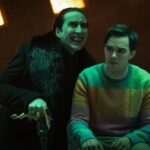Accidental Exploitation, by Tyler Smith
Watching Stephen Daldry’s Extremely Loud and Incredibly Close is a deeply frustrating experience. On the one hand, we see a lot of very workable elements; an ensemble of great actors, a dependable screenwriter, solid composer, and intriguing source material. With all of these separate components at play, this could and should have been one of the better films of the year.
All that’s on the one hand. Alas, there is always the other.
So much of this film gets bogged down in the sheer movieness of it all. The score gets laid on thicker than molasses. The characterizations are relatable to the point of simplicity. The cinematography and editing work together to create the most heightened emotions possible. And the quirk. The constant, unrelenting quirk. Every character has an unusual hobby or an odd habit. Our protagonist can tell you with exact precision how long he’s been working towards his goal, to the exact number of seconds. Only in the movies do you find characteristics like that.
Of course, there’s nothing wrong with a movie being a movie. There are plenty of intensely quirky films that I enjoy a lot (see the works of Jim Jarmusch, Spike Jonze, and Wes Anderson for examples). The problem with the inherent falseness of the story and characters is that it all centers around the tragic events of September 11, 2001. And the less genuine a film is when dealing with a very real tragedy, the more exploitative it seems. Another example of this is Michael Bay’s unfortunate Pearl Harbor, a melodramatic romance masquerading as an exploration of the attack of December 7, 1941.
Merely depicting characters affected by these horrible events does not make for emotional exploitation. But with the wrong tone, it can seem as though the filmmakers went looking for a shortcut to the audience’s heartstrings. I’m sure if we were to ask what the filmmakers were trying to accomplish, they would say that they were trying to depict the way that grief and tragedy can bring people together. By our young protagonist’s arbitrary sampling of the New York populace (everybody has the last name “Black”), it would appear that we’re supposed to see a portrait of both suffering and solidarity. However, very few- if any- of the characters that we run across seem as though we could ever meet them in every day life. And in making everything and everybody nice and clean and tidy, the filmmakers unconsciously communicate that they are less interested in the actual human response to 9/11 than in how they want to interpret it.
After all, the basic story is about a young boy’s attempt to connect with his recently deceased father. The father could very well have died in any number of senseless ways. He could have been hit by a drunk driver. He could have been killed in a mugging gone wrong. He could have been struck by lightning. Any of those unexpected events could have set the story in motion. But, because the father’s death involves a milestone as loaded with meaning as 9/11, it would seem that the filmmakers wanted to do something beyond the story of our young protagonist. And, in doing so, it strongly implies that neither he, nor his widowed mother, are really that important in and of themselves; they only have importance in relation to what they allow the filmmakers to say.
So we are left with a film that doesn’t seem to care much about its direct protagonists, nor about the larger reality that it is attempting to explore. It cares only about itself.
That is not to say that the individual collaborators don’t give it their all. As mentioned earlier, many specific elements are very effective when taken on their own. The performances of the actors specifically warrant mention. As hard as the filmmakers may try (though they don’t seem to know it) to simplify their characters into basic allegory, the actors mostly don’t let them. Actors like Viola Davis, Geoffrey Wright, and Max Von Sydow make the most of their limited screen time, imbuing their characters with a humanity- and, perhaps more importantly, a specificity– that makes us yearn for a film that wasn’t trying so hard to say something, but was instead content to merely show something.
Tom Hanks and Sandra Bullock have the hardest tasks, unfortunately. They perhaps more than anybody else in the cast are meant to play types, not people. Hanks has to create a three dimensional character out of a collection of the most noble and flawless character traits that you’re ever likely to see. This is not a real husband and father; he is a saint. Always patient, always wise. Hanks, who was likely cast in the part due to his inherent likability, does what he can with the role, but he cannot transcend a character that is meant only to be the essence of the “Lost Loved One.” He is not allowed a single problem, lest we… what? Lest we think his death was not tragic?
And Bullock is not allowed to do much either. She does what she can, but it’s a very frustrating character. She is whatever the story needs her to be. If she needs to be an emotionally absent parent, unable to connect with her son, then that’s what she will be. But, at the end, when she is supposed to turn on a dime and display a level of understanding heretofore unimaginable, there she is. She is less a person than a function of the plot. She is not allowed to have her own emotions. She will feel what the film tells her to feel, dammit!
A pleasant surprise for me was the performance of newcomer Thomas Horn as Oskar, our protagonist. The character is written as precocious and witty. Precocious children can be absolute death in a movie; few things ring more false than a 10-year-old speaking as though he were thirty-five. And, indeed, if a lesser actor had played this role, he would have been absolutely insufferable. Horn turns in a layered, nuanced performance. I really believed that Oskar truly did not understand what he was supposed to be feeling. His grief is mixed with a deep shame and a deep longing. And, unlike most other characters, he is allowed to be flawed. As he becomes obsessed with his goal of seeking the lock that matches a key he found in his father’s closet, he starts to lose touch with the other people in his life that genuinely care about him. There is a notably effective scene in which he displays such callous cruelty to his mother that we sit up and take notice.
There is a messiness to grief that the film, by and large, is not willing to explore, but the character of Oskar- while often a series of artistically misplaced quirks and witticisms- is allowed to be as real a person as the film can muster. And Horn manages to make the most of every opportunity afforded him. I’m excited to see what he does next.
There are a few scenes here and there that work, and they are almost always between Horn and somebody else. The narrative engine slows down just long enough for these characters to have a real dialogue and a real connection. Just for a moment, though, and then the machine starts back up. When I watch those scenes, I see what the film could have been. In attempting to be as specific and as real as possible, the filmmakers could have made the story of Oskar into a very effective allegory for grief in general, and 9/11 in particular. Ironically, the broader the film goes, the more muddled the allegory becomes.
I’d be lying if I didn’t say that there were times when Extremely Loud and Incredibly Close didn’t affect me emotionally. Sometimes just being reminded of the very fact of the 9/11 horrors can be enough to jar me to attention. But those feelings of emotional engagement with the film quickly dissipated once I started to really think about what was causing them. Was it the film itself, or the invocation of 9/11? More often than not, I realized that my emotional response had almost nothing to do with the film and everything to do with the real life events that the film was addressing. Perhaps the filmmakers meant for that to be the case. Perhaps they intended for their audience to mistake their personal human investment in the 9/11 tragedy for investment in the story being told.
Frankly, I doubt it. Much as I might like to ascribe some nefarious methods to the filmmakers, nothing about this film is quite that cynical. No, it’s much more likely that the filmmakers started to get a little fuzzy themselves on just what they were trying to accomplish. And, in my opinion, when dealing with the real life grief of an entire nation, “fuzzy” just doesn’t cut it. Exploitation arrived at accidentally is exploitation nonetheless.































